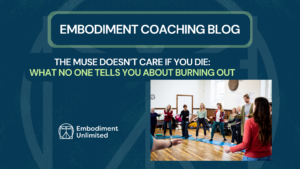Discover how embodiment coaching empowers coaches to integrate the body into personal growth, offering unique insights and addressing the challenges of fostering deeper, holistic transformation for their clients.
The practice of embodiment coaching has expanded across various countries and cultures, showcasing its evolution over time. As we observe the growth of the industry, and with over 15 years’ experience in training coaches, it has been possible to observe both the challenges and triumphs faced by coaches striving to integrate bodily awareness into their sessions.
Understanding the Landscape of Embodiment Coaching
The practice of embodiment coaching has expanded across various countries and cultures, showcasing its evolution over time. As a pioneering approach in Europe, it has been possible to observe both the challenges and triumphs faced by coaches striving to integrate bodily awareness into their sessions.
Embodiment coaching goes beyond physical movement, encompassing a holistic methodology that includes emotional, mental, and spiritual dimensions. This multifaceted perspective develops deeper connections and facilitates meaningful change in clients.
The Challenges of Mimetic Spread
A significant challenge within the embodiment coaching realm is “mimetic spread.” This refers to the diffusion of appealing concepts by imitation, such as phrases that resonate on a surface level but lack actionable steps for implementation, due to lack of depth of understanding.
Personal growth practices often contain vague language, making it difficult for coaches to apply effective strategies. Tackling this challenge involves clarifying concepts and offering practical, concrete tools that can be integrated into coaching work.
Self-Awareness and Presence in Coaching
For coaches, effective embodiment work begins with self-awareness and presence. The coach’s embodiment—their presence, awareness, and emotional state—greatly influences the coaching relationship. Clients often reflect or mirror the coach’s state, making it essential for coaches to cultivate self-awareness.
Developing this awareness requires ongoing reflection, particularly for those deeply engaged in personal growth work. Coaches must pay attention to how their state impacts their interactions with clients.
Part One Summary
In this initial exploration of embodiment coaching, we have examined the foundational principles that render this practice distinctive.
Embodiment coaching goes beyond mere physical movement, encompassing emotional, mental, and spiritual dimensions to facilitate profound and meaningful change.
At the core of effective embodiment work lies the coach’s self-awareness and presence, which significantly influence the coaching relationship and client outcomes. This understanding paves the way for more in-depth discussions on the nuances and opportunities present in embodiment coaching.
Become a certified embodiment coach
Learn the principles, tools and techniques you need to coach safely and effectively with the body. You’ll explore ways to work with your clients to bring about real, lasting change and support them in their growth.
For more information about the Certificate of Embodiment Coaching – visit our CEC page



